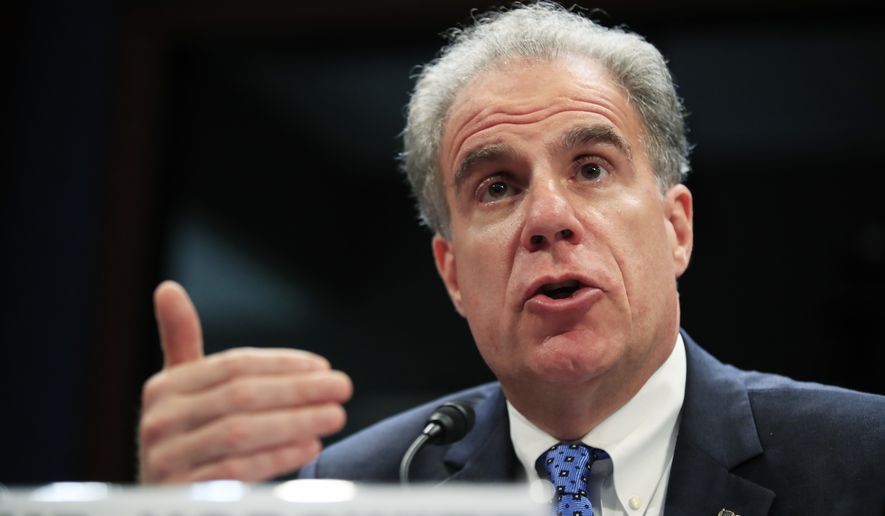The problem at the FBI wasn’t so much rogue agents or biased leadership but bureau rules that allowed for a lengthy and largely fruitless investigation of the Trump campaign, Justice Department Inspector General Michael E. Horowitz said Monday.
The bureau was able to open the probe without needing to alert the Justice Department, and zealous agents were able to get a secret surveillance warrant on a presidential campaign figure based on faulty information, without ever having to get corroboration from an independent source, the report concluded.
In both of those cases, the agents were following the guidelines laid out in FBI manuals, allowing them to pursue the investigation that ripped at the country for much of the past two years, Mr. Horowitz concluded in his major report looking into the Obama administration’s actions.
“We found it concerning that department and FBI policy did not require the FBI to consult with any department official in advance of conducting [confidential human source] operations involving advisers to a major party candidate’s presidential campaign,” the inspector general said.
Those conclusions were lost amid political shouting Monday over whether political bias helped spark the Trump investigation.
Mr. Horowitz largely cleared the FBI of bias, saying the bureau appeared to meet its own standards for when to open an investigation.
DOCUMENT: Read the report from the DOJ Office of the Inspector General
But he delivered a scathing evaluation of those standards and the other FBI rules surrounding those kinds of decisions, saying he was stunned to learn the bureau can launch a sensitive investigation on a political party’s presidential nominee without any serious top-level approval or Justice Department oversight.
The FBI launched its Trump investigation in late July 2016 after the bureau received a tip from an Australian diplomat that a Trump campaign figure had let slip that there was a chance the campaign could coordinate with Russia to release dirt on Democratic nominee Hillary Clinton.
Mr. Horowitz said given the “low threshold” FBI rules had for launching an investigation, the bureau did not violate its policies. It was “a discretionary judgment call left to the FBI,” the probe found, and only later did the FBI clue in its masters at the Justice Department on the move.
When the FBI recruited sources to meet with Trump campaign figures to try to get them to leak what they knew, the bureau again did not get Justice Department approval, the audit found.
“We therefore believe that current department and FBI policies are not sufficient to ensure appropriate oversight and accountability when such operations potentially implicate sensitive, constitutionally protected activity, and that requiring department consultation, at a minimum, would be appropriate,” Mr. Horowitz wrote.
Mr. Horowitz said that in addition to a lack of rules, there was also a lack of training, with agents sometimes not knowing what was in bounds and what wasn’t.
SEE ALSO: FBI warrant application to spy on Carter Page was fraught with errors: IG report
In perhaps the biggest hiccup, agents made 17 significant errors in their effort to get a secret warrant from the court, set up under the Foreign Intelligence Surveillance Act, to spy on Trump adviser Carter Page.
Mr. Horowitz said agents “overstated” the information obtained by former British spy Christopher Steele, who was paid by Democrats to dig up dirt on then-candidate Donald Trump.
The Steele dossier has now been largely discredited and was never verified even at the time it was used to obtain a FISA warrant.
Mr. Horowitz said agents should have been more forthcoming in the flaws in Mr. Steele’s information — both with the Foreign Intelligence Surveillance Court and with higher-ups in the FBI and the Justice Department. He said his investigation never got a good answer as to how the process broke down.
Rather than find fault with the agents’ motives, he blamed the FBI’s own rules, saying what is known as the “Woods Procedures” — which governed the use of the Steele information — allowed agents to sell it to the FISA court without getting any independent confirmation.
Mr. Horowitz said what he found in his investigation was troubling enough that he has opened another audit of the FBI’s Woods Procedures.
The American Civil Liberties Union said the FISA revelations should spur Congress to step in and make changes.
“The concerns the Inspector General identifies apply to intrusive investigations of others, including especially Muslims, and far better safeguards against abuse are necessary,” said Hina Shamsi, director of the ACLU’s national security project. “The system requires fundamental reforms, and Congress can start by providing defendants subjected to FISA surveillance the opportunity to review the government’s secret submissions.”
Mr. Horowitz made his own series of recommendations, including:
⦁ A new FISA request form, to make sure the FBI isn’t concealing any relevant exculpatory information when it requests a secret surveillance warrant.
⦁ New guidelines to tell agents to get verification before relying on some assertions — and to check with other agents to make sure sources are credible.
⦁ Rules for the FBI to alert the Justice Department before opening an investigation on a matter as sensitive as a presidential campaign, and rules on how such a probe can be conducted.
⦁ Clearer standards for dealing with confidential sources such as Mr. Steele, who was able to work as a political operative paid by Democrats at the same time he was feeding information to the FBI.
The FBI said it accepted all of the recommendations and was working on changes.
• Stephen Dinan can be reached at sdinan@washingtontimes.com.




Please read our comment policy before commenting.